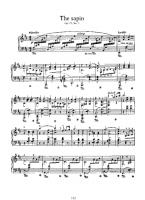

Like Heifetz (and, except for Gidon Kremer, unlike today's violinists) Oistrakh plays the first and third movements exceptionally fast. Except for Heifetz's two recordings and an almost-impossible-to-find one by the little-known Julian Sitkovetsky, this is the most brilliant and intense Sibelius Concerto on records. The Sibelius performance is simply phenomenal. And more successfully than any other performance known to this writer, Oistrakh - with his strength of tone, security of rhythm and genial temperament - keeps the final movement from becoming a letdown. Unlike some other players - most notably Yehudi Menuhin, Joseph Szigeti and Oistrakh's younger Soviet rival, Leonid Kogan - the violinist stresses the serenity, rather than the depths, of the slow movement. The Beethoven shows a violinist at the height of his powers, with a superb grasp of the structure of each movement and of the concerto as whole. Both of these performances are to be preferred to the still remarkable ones the violinist was to record later. But his earlier performances - these 1954 accounts of Beethoven and Sibelius, superbly partnered by Ehrling with a fine orchestra, were the first commercial recordings Oistrakh made of concertos in the West - show a somewhat different and perhaps greater violinist.Īs he grew older, Oistrakh's tempos inevitably became slower and his enormous (though never forced) tone became slightly less secure. Oistrakh was still perhaps the world's greatest violinist - with a powerful tone of unmatched beauty, a technique that solved violinistic problems with ease and musical instincts that penetrated to the heart of the matter. One says "unfortunately" with hesitation.

Unfortunately, the recordings reissued tend to be those he made after the late 1950s and the beginnings of the stereo era. It is somewhat incredible, then, that (because of World War II and the subsequent Cold War) listeners in the West had only about 20 years in which to hear Oistrakh. His position as the greatest violinist to come out of Russia since the 1917 revolution remains unchallenged of the great violinists of this about-to-be-concluded century, only Jascha Heifetz seriously rivals him in renown. Beethoven, Violin Concerto in D, performed by David Oistrakh and the Stockholm Festival Orchestra, Sixten Ehrling conducting, Sibelius, Violin Concerto in D Minor, performed by Oistrakh and the Stockholm Festival Orchestra, Ehrling conducting (Testament SBT 1032): It is now more than 20 years since Oistrakh died during a visit to Amsterdam at the age of 66.


 0 kommentar(er)
0 kommentar(er)
